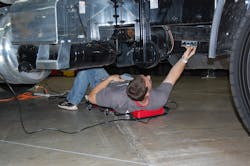SAN ANTONIO, TX – Mentoring, top-dollar investments in training, providing a long-term career path; those are but some examples of the “new thinking” being deployed in the trucking industry to help combat the still-acute shortage of technicians.
And such “new thinking” will be critical for helping bolster truck sales for the future as well, according to Mike Besson, VP-service operations for Rush Truck Centers (RTC); a division of Rush Enterprises.
“People buy trucks with the expectation of service to support them,” he told Fleet Owner here during the 2012 Rush Technician Skills Rodeo; an annual event Rush has funded with the help of suppliers such as Peterbilt, Eaton, Cummins, Hino, Isuzu, Navistar, Allison Transmission, and many others.
[To view photos from this year’s Rodeo, click here.]
“The biggest piece in my mind to recruiting and more importantly retaining technicians today is training, because investing in training emphasizes to the technician how valuable a resource they are to our company,” Besson explained. “We spend $3.5 million to $4 million a year on training not just because it makes them [the technicians] better; it also improves the level service they can offer our customers.”
Yet it’s not just finding and keeping technicians that’s posing a perplexing problem for the industry, he said; it’s also about developing quality staff for the next level in a shop’s hierarchy.
“It’s not just tough to get technicians,” Besson said, noting that RTC has enough work to bring on 350 technicians in addition to the 1,400 currently in its ranks.
“It’s tough to find the next generation of shop managers, too: the shop foremen and service manager," he pointed out. "That’s one reason we started a mentoring program last year; not just to provide more support to our less experienced technicians but also to help us find and develop leadership qualities in out more senior techs so they can take they step up in their careers.”
RTC right now has 60 “mentors” in its program, with one veteran providing support for just one junior tech. “It’s a one-on-one program only because we’re not only trying to provide in-depth support for less experienced hands, we really want to see who has those leadership qualities that will make them a good shop foreman or service manager down the road when they are ready to make the next transition in their career.”
Creating such a long-term “career path” is not only vital for retaining well-seasoned hands within a shop organization, it’s vital to retaining what Mike Mowry calls “tribal knowledge” as well.
“All I ever did was turn wrenches in the 35 years I’ve been in this business, and I benefitted from the ‘tribal knowledge’ about truck maintenance passed down from one generation of technicians to another,” Mowry, operations manager for RTC’s Pico Rivera facility outside Los Angeles, told Fleet Owner.
“Today, however, the technology advances are almost outrunning the industry; the complexity of technology, mainly around the emissions control systems, is outpacing that generational knowledge and leaving us with a void to fill,” he said.
That’s why the focus on providing more continuous training while establishing a career path to keep the recipients of that training in-house for the long-term is so critical, Mowry believes.
“You can’t learn it all on the job now, because every time we learn something new, another layer of technology and complexity gets added,” he explained. “For example, we just finished all this work from 2007 through 2010 learning about DPFs [diesel particulate filters] and SCR [selective catalytic reduction] only to be faced with new systems to meet heavy truck greenhouse gas [GHG] and fuel economy rules.”
That’s another reason why emphasizing the career aspects of the truck technician’s job plays an important role in convincing younger workers to choose it as a long-term profession, noted Ray Wheeling, VP-advanced training for the Universal Technical Institute (UTI).
“The biggest challenge is working through the ‘pre-conceptions’ about the technician career, because today it’s a sophisticated highly professional career that relies on technology skills, not so much turning wrenches anymore,” he told Fleet Owner.
The challenge is the truck repair industry is competing against a lot of different career paths now that employs those same skill sets, he said, meaning it must “sell itself” more effectively as an industry young people want to choose as a life career.
RTC’s Besson said he knows that challenge all too well, which is why Rush is spending a lot of money on “branding” initiatives to make RTC and employer of choice for veteran techs and newbies alike.
“A shop is a shop is a shop – we all do pretty much the same thing work wise,” Besson explained. “It’s what we do that other shops don’t that will make the difference. These guys need a career path so when we find them, we can hang onto them and their skills until they retire.”
About the Author
Sean Kilcarr
Editor in Chief
Sean Kilcarr is a former longtime FleetOwner senior editor who wrote for the publication from 2000 to 2018. He served as editor-in-chief from 2017 to 2018.
